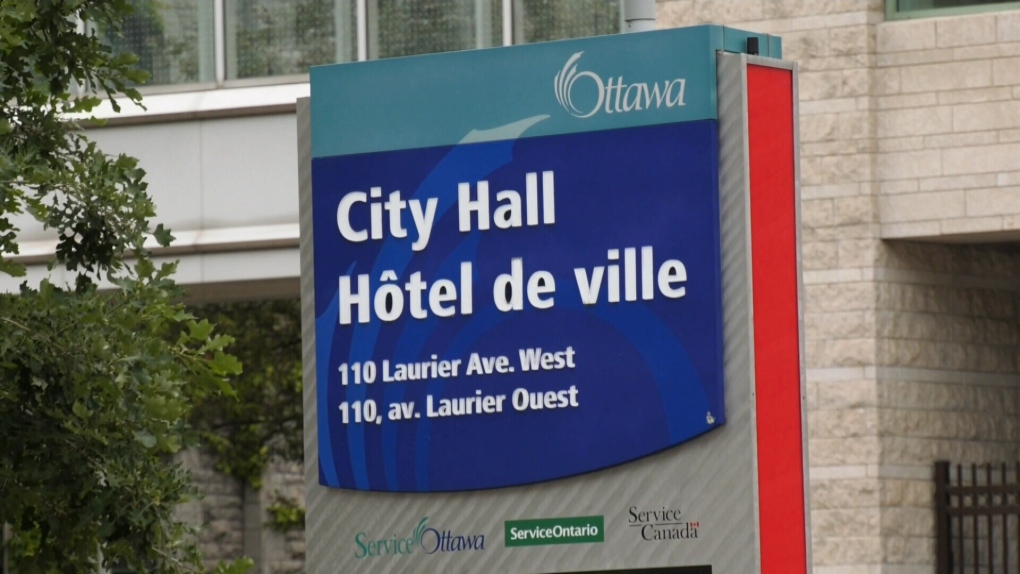Community services committee approves new transitional housing strategy
 City Hall in downtown Ottawa is seen in this undated file photo. (CTV News Ottawa)
City Hall in downtown Ottawa is seen in this undated file photo. (CTV News Ottawa)
The city of Ottawa's community services committee has approved a plan that aims to address the housing and homelessness crisis.
The city first declared a housing and homelessness emergency in early 2020, prior to the COVID-19 pandemic. Since then, demand for shelters has increased. Shelters serving single men and single women are currently over capacity, according to a report prepared for committee.
To help alleviate homelessness in Ottawa, staff are recommending committee and council approve an integrated transition to housing strategy that would help find housing for people who become homeless and support them to remain housed while they transition to long-term housing.
In the short-term, staff are looking to develop a prototype housing allowance for singles that could support up to 120 adults and decrease reliance on the shelter system.
The staff report says that provincial housing supports are insufficient to meet market rent in Ottawa.
"Staff are noticing that the provincial maximum allowable rent for a one bedroom apartment is $1,347 (starting July 1, 2023), when summary and averaging of currently listed one-bedroom apartments shows the true median rent in Ottawa for a one bedroom to be $1,800," the report says. "This discrepancy has proven to be a barrier for singles experiencing homelessness, often in receipt of Ontario Works and Ontario Disability Support Program, trying to access private market units since the funding formula caps the benefit based on a rent calculation of $1,347 per month."
The program aims to give a deeper subsidy to make market rent more accessible. Eligible people include single adults who are homeless and single clients in supportive housing who could benefit from additional help to transition to a market rent unit, freeing up space for someone else who needs supportive housing.
Staff estimate the cost of this modified housing allowance to be around $2 million per year. It would be funded within the existing approved housing and homelessness budget and other operating budgets.
City staff say 57 units of supportive housing have been completed to date in 2023 and another 198 are being built and should be available in the next 18 months. One hundred and forty-nine supportive housing units were built between 2020 and 2022. Despite this, at least 337 people remain on a waitlist for supportive housing as of April.
Over the long-term, staff suggest building a supportive housing community hub that could focus on transitioning people to permanent housing.
The plan was approved unanimously at committee and will rise to full city council for consideration July 12.
CTVNews.ca Top Stories

DEVELOPING Police find bag carried by gunman who killed UnitedHealthcare's CEO, say he likely fled NYC on bus
Investigators found a backpack in Central Park that was carried by the shooter, police said Friday, following a massive sweep to find it in a vast area with lakes and ponds, meadows, playgrounds and a densely wooded section called 'The Ramble.'
A police photographer recounts the harrowing day of the Polytechnique massacre
Montreal crime scene photographer Harold Rosenberg witnessed a lot of horror over his thirty years on the job, though nothing of the magnitude of what he captured with his lens at the Polytechnique on December 6, 1989. He described the day of the Montreal massacre to CTV Quebec Bureau Chief Genevieve Beauchemin.
Quebec premier wants to ban praying in public
Premier François Legault took advantage of the last day of the parliamentary session on Friday to announce to 'Islamists' that he will 'fight' for Quebec values and possibly use the notwithstanding clause to ban prayer in public places such as parks.
Northern Ontario man sentenced for killing his dog
WARNING: This article contains graphic details of animal abuse which may be upsetting to some readers. A 40-year-old northern Ontario man is avoiding prison after pleading guilty to killing his dog earlier this year.
'Home Alone' house up for sale for US$3.8 million in Chicago suburb – but not the one you're thinking of
Social media sleuths noticed that the house next door to the iconic 'Home Alone' house in Winnetka is now up for sale.
Purolator, UPS pause shipments from couriers amid Canada Post strike
Purolator and UPS have paused shipments from some courier companies as they try to work through a deluge of deliveries brought on by the Canada Post strike.
NDP's Singh forces debate on $250 cheques for more Canadians; Conservatives cut it short
With the fate of the federal government's promised $250 cheques for 18.7 million workers hanging in the balance, the NDP forced a debate Friday on a motion pushing for the prime minister to expand eligibility. The conversation was cut short, though, by Conservative MPs' interventions.
Sask. father who kept daughter from mom to prevent COVID-19 vaccine free from additional prison time
Michael Gordon Jackson, the Saskatchewan father who withheld his then seven-year-old daughter from her mom for nearly 100 days to prevent the girl from getting a COVID-19 vaccine, was handed a 12-month prison sentence and 200 days probation on Friday, but credited with time served.
South Korea president apologizes for declaring martial law, but did not resign. Now he faces an impeachment vote
South Korean lawmakers are set to vote later Saturday on impeaching President Yoon Suk Yeol over his short-lived attempt to impose martial law, as protests grew nationwide calling for his removal.

































